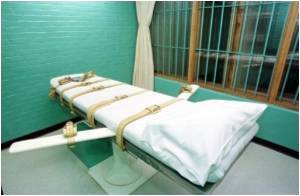
Only one pharmaceutical company in the United States, Hospira, currently manufactures the drug, the anesthetic sodium thiopental.
But it is out of stock and will not be able to resume production until the first quarter of 2011, and Hospira's most recent batch is nearing its 2011 expiration date.
Some states like Texas and Ohio have enough thiopental to carry on with their execution schedules, but others like Kentucky have been forced to put capital punishment on hold.
"In this country we are so used to having executions, it makes legislators nervous" when they are halted, Deborah Denno, a criminal law professor at Fordham University in New York, told AFP.
"The more you delay, the more people realize that the death penalty doesn't serve the purpose it's supposed to serve."
Advertisement
The central state of Oklahoma has borrowed doses of the drug from its neighbor Arkansas.
Advertisement
For the lawyers for Arizona death-row inmate Jeffrey Landrigan, a convicted murderer scheduled to die next Tuesday, that raised enough questions about the safety and efficiency of the drug to bring the matter to court.
"Landrigan faces a significant risk that Arizona Department of Corrections unknowingly has obtained counterfeit or non-viable drug," they argued in a petition before the Arizona Supreme Court.
"If the second or third drugs in the state's protocol, pancuronium bromide and potassium chloride, were to be injected into a prisoner who was not properly anesthetized, the result would be excruciating pain in violation of the (US Constitution's) eighth amendment" which bars cruel and unusual punishment, they said.
"Accordingly, Landrigan needs information from the state to insure that sodium thiopental used in his execution is chemically stable and has not expired."
The lawyers noted that since Hospira is the only US manufacturer approved by the Food and Drug Administration, any new thiopental could only come from a foreign country.
Lawyers have put forward similar arguments in California.
Arizona has rejected the argument, but a federal judge has ordered the state to disclose the origins of the drug.
Professor Denno said the states may have acquired drugs of inferior quality.
"If it's coming for example from China, which has used lethal injection... we don't know who is making the thiopental in China or where that's coming from," she said. "Their system is completely secretive."
She described the drug shortage and resulting disarray as "troubling."
The Arizona district attorney's office argued that details about the transport and delivery of the drug must remain strictly confidential for security reasons.
At a recent hearing, an Arizona judge sounded puzzled about the need for FDA approval for the drug.
"What difference does that make?" judge Andrew Hurwitz asked.
"It strikes me as strange that the FDA law was meant to regulate executions... These are drugs that are going to be used to kill somebody."
An FDA spokeswoman, Karen Riley, told AFP that the agency was "not aware of any importations of this drug." FDA approval is required for all imports of medicines that are out of stock in the United States.
Thiopental is used as part of a three-drug cocktail for lethal injections. It is the first drug to enter a victim's body, rendering him or her unconscious. A second drug paralyzes the muscles, and a third stops the heart.
Source-AFP








